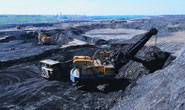Report slams low-carbon tar sand "myth"
 Joint Co-operative Group-WWF report warns that even with the most optimistic projections for CCS development, exploiting tar sands for oil remains highly carbon intensive.
Joint Co-operative Group-WWF report warns that even with the most optimistic projections for CCS development, exploiting tar sands for oil remains highly carbon intensive.The potential rollout of carbon capture and storage (CCS) technology should
not be used to justify the continued expansion of Canada’s controversial tar
sands industry, according to a major
investor-backed
report released yesterday.
The report, from Co-operative Financial Services and WWF-UK, challenges oil
industry and Canadian government claims that fitting emerging CCS technologies
to the plants used to extract and refine oil from tar sands will sufficiently
limit the emissions generated from the energy-intensive process.
The study found that the amount of CO2 emitted during production needs to be
reduced by about 85 per cent to make tar sands oil comparable with conventional
oil – way beyond the most optimistic forecasts for CCS.
It added that even under the most optimistic scenarios for the application of
CCS, the projected production emissions from tar sands developments would be
greater than the whole of Canada’s 2050 carbon budget were it to stick to its
existing emission-reduction targets.
It also calculated that the maximum potential of CCS would not reduce life
cycle emissions of tar sands oil to levels needed to meet emerging international
low-carbon fuel standards, such as those adopted in California and the EU.
Paul Monaghan, head of social goals at Co-operative Financial Services, said
the report showed that "even the most wildly optimistic scenarios for the
development of CCS fail to bring emissions down to those of today’s conventional
fossil fuels".
He added that the research further highlighted the investment risks
associated with tar sands projects that remain largely incompatible with global
efforts to curb carbon emissions.
The Co-operative Group has been campaigning against carbon-intensive
investments such as tar sands projects, arguing that the likely introduction of
carbon legislation and emission pricing schemes mean they present significant
long-term risks for investors.
Last year, the company released research showing that oil produced from tar
sands emits on average three times more CO2 through its life cycle than
conventional oil. It also warned that exploiting Canada’s tar sands alone could
increase global atmospheric CO2 concentrations by more than 10 parts per
million.
David Norman, director of campaigns at WWF-UK, warned that the continued
focus on fitting CCS to tar sands plants was "diverting money away from projects
that will help meet the global energy demand without damaging the climate". He
added that "Canada should invest in other low-carbon technology and stop the
expansion of tar sands.
You can return to the main Market News page, or press the Back button on your browser.

